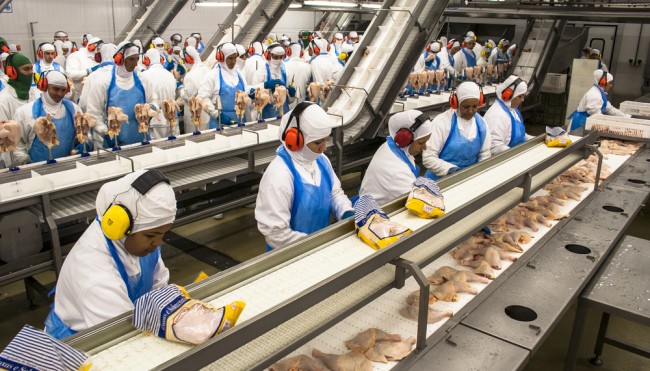
That was the title of the Süddeutsche Zeitung on January 15th, 2020
(https://www.sueddeutsche.de/wirtschaft/lebensmittel-menschenrechte-1.4758022).
The article presents a study recently published by Germanwatch and MISEREOR, which shows clear deficits in respecting human rights in the entire supply chain of food companies.
For the study, the two organizations took a close look at 15 large German companies from the poultry, milk, feed and agricultural chemicals sectors with regard to “Human rights due diligence in the agricultural sector”. The results are very indicative of a profit-oriented capitalist economy. Not a single one of the 15 companies fulfills the requirements of the UN guiding principles for business and human rights.
When selecting the companies to be examined, Germanwatch and MISEREOR concentrated on the most important sub-areas of German agriculture. This includes the production of animal products and the associated feed production, which represent the largest part of the agricultural production value in Germany (BLE 2018). In the field of meat production, the companies selected the 5 largest poultry meat producers, including the PHW group (Wiesenhof) with the following reasons.
From the 2020 Global Agriculture and Human Rights Report: German companies and politics put to the test p. 47:
“In the meat sector, the scope of the present survey only allowed a small selection of examinations. In the sense of a risk-oriented study, the following factors were decisive in choosing the poultry sector:
1.) The
export share of poultry meat produced in Germany is around 50 percent
(Thobe et al. 2019: 3) and is therefore the highest in comparison to
the other meat sectors.
2.) For several years, reports on
poultry meat exports to markets in the global south have been
documenting human rights-relevant effects for small farmers (Maas et
al. 2015, Mari 2017).
3.) In addition, reports from poultry meat
production, slaughter and processing have been proving very
problematic working conditions, especially for migrant workers (see
box, p. 58f).
In addition, the exposure of poultry meat to
antibiotic-resistant germs is higher than for other types of meat
(BVL 2019: 52). This goes hand in hand with the fact that the
health-related exposure of employees in the poultry industry is even
higher than in other areas of meat production.
Overall, these criteria led to the present report in the meat sector addressing the five leading companies in the poultry industry. These are the PHW group, Rothkötter, the Sprehe group, Heidemark and Plukon. “
The German poultry meat producers in particular performed particularly poorly in the study. For example, none of the five companies are committed to respecting human rights. The PHW Group is only expected to do this by its suppliers.
According
to the study, there are considerable human rights risks associated
with poultry meat production:
For example, growing soy for
animal feed often leads to land evictions and toxic pesticide use in
South America. The massive use of antibiotics * in animal husbandry
also increases demand in the antibiotic production countries of India
and China. This also increases the risk of resistance. Exports of
poultry parts from the EU threaten the economic survival of local
producers in West Africa and endanger their livelihood. The experts
also see deficits in Germany. For example, the working conditions in
German slaughterhouses are sometimes inhumane.
The study on pages 58 and 59 provides a detailed report on labor and human rights violations in the Süd Oldenburg meat industry. Here the unemployed self-help Oldenburg (ALSO) documented terrifying conditions from their advisory work.
“Migrant workers have to live in run-down apartments that are crammed with usury rents with contract workers” (LCV 2018). The rent, which is often completely excessive, is usually deducted directly from the wages and in the event of termination, the workers also lose the roof over their heads (ALSO 2018: 8). ”
“Many
workers work twelve hours a day, six days a week until they are
completely exhausted.”
“As a rule, employment
contracts in the meat industry are limited, often to the length of
the trial period. Terminations are possible at short notice and for
no reason. In addition, a large proportion of the employees are
employed through contracts for work or on loan. “
Current legal proceedings show that human rights violations in the poultry industry and especially in the slaughtering and cutting factories are no exceptions. For example, a trial is currently taking place at the Oldenburg Regional Court in which two men are accused of employing foreign workers without a permit between 2007 and 2010 and thereby making profits in the millions. They are said to have operated a kind of intermediary between the meat processing company Wiesenhof in Lohne in Lower Saxony and probably several Bulgarian companies. The witnesses invited in the process speak of hourly wages of three to four euros.
Representatives of the “Oldenburger Geflügelspezialitäten GmbH & Co. KG”, better known under their brand name Wiesenhof, also sit in the courtroom. They are calling for the proceedings to be terminated, including by referring to the Federal Constitutional Court. This has not yet made a decision when asked whether the company has to pay the illegally obtained profit even in cases that have already expired.
Already in 2017, a process of illegal employment at the Wiesenhof subsidiary Geestland of over 900 workers took place at low wages. In the end, the two accused (Geestland managing director Norbert Deeken and the former Wiesenhof authorized officer accused of subsidies and Pro Work managing director Frank Diekmann) were acquitted by the Oldenburg district court. The allegation has been proven, but the deeds have already expired. Nevertheless, PHW / Wiesenhof has to pay the wage costs saved by the dumping wages to the group account to the state treasury. These are ten million euros that actually belong to the exploited workers and not to the state, which then subsidizes huge animal factories with this money.
Our demands:
We call for the end of exploitation of workers in the animal industry.
We want good and fair jobs! We therefore call for an immediate, solidary structural change program financed by the assets of the PHW Group and the entire animal industry for regions that were previously dominated by the animal industry. We demand expropriation of the industry and continuation under worker control. This goes hand in hand with a conversion of the factories into ecologically compatible and solidary plant production facilities under the self-administration of the workers.
* From the 2020 Global Agriculture and Human Rights Report: German companies and politics put to the test / Box 3: Antibiotic production without wastewater treatment as the cause of the spread of antibiotic resistance p. 57: “Worldwide, 73 percent of all antibiotics produced are used in intensive factory farming (Boeckel 2019: 1), around half of these valuable medicines in Germany. Some corporations such as B. the PHW Group, which also includes Wiesenhof and Lohmann Pharma, produce meat as well as veterinary and human pharmaceuticals, including antibiotics from purchased active ingredients (Lohmann Pharma 2019)”
Sources:
https://germanwatch.org/de/17697
https://www.sueddeutsche.de/wirtschaft/lebensmittel-menschenrechte-1.4758022
https://taz.de/Wiesenhof/!t5025718/
https://taz.de/Prozess-gegen-Wiesenhof-Schlachterei/!5447904/
https://www.ndr.de/nachrichten/niedersachsen/oldenburg_ostfriesland/Kossen-Brueder-beklagen-Schimmelzimmer-fuer-Arbeiter,kossen288.html
https://www.ndr.de/nachrichten/niedersachsen/oldenburg_ostfriesland/Praelat-Kossen-fordert-Lobby-fuer-Arbeitsmigranten,kossen268.html
https://www.ndr.de/fernsehen/sendungen/panorama3/Wiesenhof-Das-Schicksal-der-Werkvertrag-und-Leiharbeiter,wiesenhof544.html
http://www.ndr.de/nachrichten/niedersachsen/oldenburg_ostfriesland/Landgericht-spricht-Ex-Wiesenhof-Manager-frei,wiesenhof630.html
